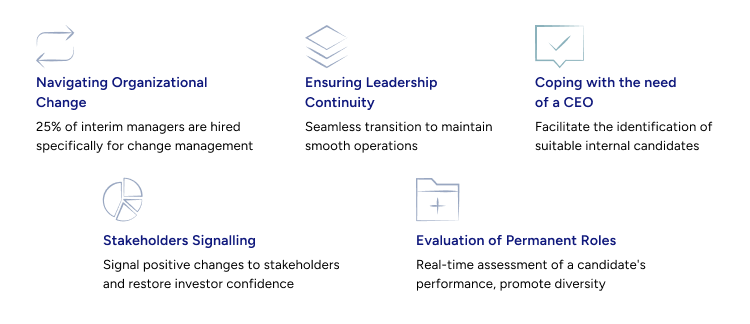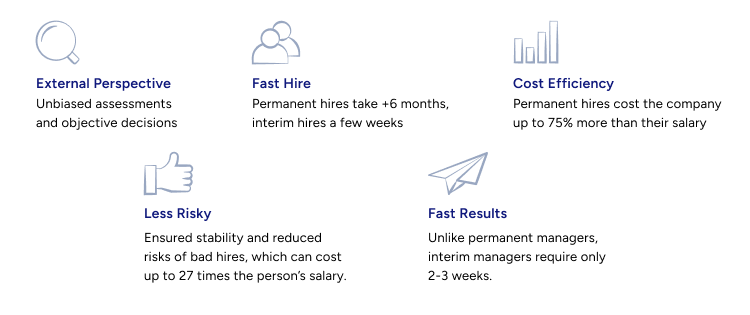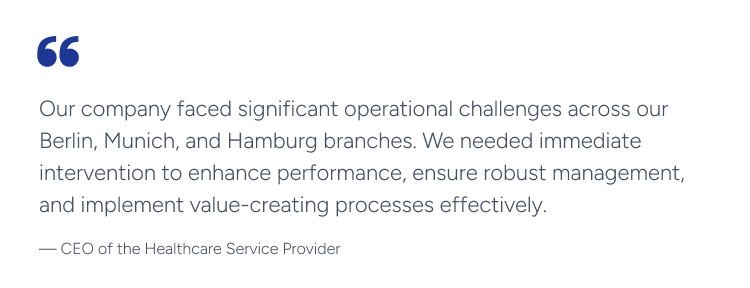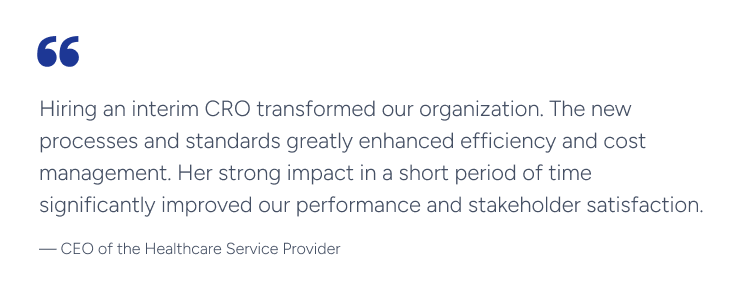Interim Managers Role and Impact: A Complete Guide



Interim management involves delivering effective business solutions by independent board or near-board level managers or executives for a limited period, usually ranging from 6 to 12 months. As companies fundamentally reassess their talent acquisition and engagement strategies, embracing a new paradigm for accessing leadership, skills, and expertise is not just optional—it's a strategic imperative.
Indeed, the use of interim executives in C-suites across the Fortune 1000 has increased by 117% since 2022. This trend reflects a broader recognition of the value that interim leaders bring to organizations, particularly in times of rapid change and uncertainty.
In this article, we will discuss the rise of interim leadership and the growing demand for interim managers across various roles and functions, answering these questions:
- What drives the increasing demand for interim managers?
- When is the right time to hire an interim manager?
- What benefits do interim managers bring to an organization?
- How can businesses find the right interim manager to meet their specific needs?
The Rise of Interim Leadership
Interim Managers cover a wide range of projects, including change management, transformation, turnaround management, business improvement, crisis management, and strategy development.
Interim Managers often have qualified expertise across multiple sectors and disciplines. They engage in consulting, planning, and implementing best practices before their departure or their permanent hire, offering unbiased, results-driven expertise, and are accountable for achieving tangible outcomes, but without the constraint of traditional employment.
Interim Managers: Demand per Role
Interim managers are brought in to fill various roles, with 56% occupying C-suite positions, 30% serving as SVPs or VPs, and 14% taking on senior director or lower roles. The functions they cover mostly include finance, operations, human resources, digital and IT, marketing and sales, and general management. This diversity in roles highlights the broad applicability of interim management across different organizational needs.

Interim Managers: Demand per Function
The most acute need for interim leaders is within the finance function. Requests for interim CFOs, for example, represent 54% of all interim C-suite needs, with a year-over-year increase of 46%. Additionally, there is a substantial demand for SVP/VP-level finance leaders, such as Controllers and heads of Financial Planning and Analysis (FP&A), with an increase of 114% since 2022. Beyond finance, interim leaders are also sought after in human resources, digital, data, and IT functions, which have seen a 47% increase in demand.

When to Hire Interim Managers?

Navigating Organizational Change
Interim leaders are frequently chosen following unexpected leadership departures. According to a survey of 375 US firms in 2017, poor organizational performance often drives the choice of hiring an interim manager. In fact, there is a higher probability of selecting interim CEOs when the board dismisses the previous CEO.
In particular, interim managers with change management mandates can significantly influence organizational culture by challenging the status quo and introducing new ideas. 25% of interim managers are hired specifically for change management and transformation projects, underscoring their importance in the organization’s change.
Ensuring Leadership Continuity
Top-performing companies can also take advantage of interim managers. One of the most valuable aspects of hiring interim managers is the continuity of leadership they can provide during a given period. During transition periods or after an unexpected departure, interim managers can be a good solution to maintain a smooth operation of daily activities.
Their presence stabilizes the organization and helps the team adapt. When a permanent leader is chosen, the interim manager can offer valuable insights and guidance, ensuring a seamless transition. In some cases, the interim manager may even step into the permanent role.
Coping with the need of a CEO
The choice of interim leaders is strongly influenced by the availability of suitably qualified candidates. Companies frequently select interim leaders to prevent board members from assuming operational roles and to allow sufficient time to reach a consensus on a permanent successor.
For instance, a study of 582 unplanned CEO departures investigated whether appointing an interim CEO could facilitate the leadership transition process. They have shown that appointing interim CEOs facilitates the identification of suitable internal candidates for the permanent CEO role, smoothing the transition for newly appointed CEOs.
Stakeholders Signalling
Appointing an interim successor can signal positive changes to stakeholders, particularly shareholders, thus helping restore investor confidence. Investors view interim managers and permanent external successors more favorably after an integrity failure.
Appointing an interim manager can signal stakeholders that the organization is proactively addressing critical issues. This is particularly important during financial distress, public relations crises, or significant operational changes. Furthermore, their ability to provide objective insights helps in making informed decisions that are crucial for the organization's reputation and stability.
Evaluation of Permanent Roles
Hiring an interim executive who is also considered for the permanent position provides a unique opportunity for decision-makers to evaluate their capabilities and suitability firsthand. This approach not only allows a real-time assessment of the candidate's performance and leadership style but also offers an opportunity for potentially less experienced candidates to prove their potential.
Furthermore, it can serve as a powerful statement about the organization’s commitment to promoting inclusion and diversity. In practice, this strategy can lead to improved retention rates among high-potential employees who feel their career progression is supported. Additionally, it can enhance the organization's reputation as an employer of choice, attracting top talent who value diversity and inclusion in the workplace, proven to increase revenue by 10% due to higher innovation.
Benefits of Interim Managers for Businesses

The adoption of interim managers has emerged as a strategic asset in leadership, benefiting an increasing number of companies. When the need arises, engaging interim managers presents a timely and efficient remedy. The most significant advantages provided by hiring interim managers include:
External Perspective
Interim managers bring an objective and independent perspective to the organization. Free from internal politics and long-term obligations, they can provide unbiased assessments and make decisions that are in the best interest of the company.
This impartiality is beneficial for identifying areas for improvement and implementing changes that might be difficult for internal staff to recognize or advocate for. Their external viewpoint can lead to innovative solutions and more effective problem-solving strategies.
Fast Hire
The speed at which interim managers can be hired is a significant advantage. While 68% of traditional hiring processes for senior commercial leaders can take over six months, interim managers can often be placed within a few weeks. For instance, Consultport ensures clients are matched with the right interim manager or expert within 48 hours.
Cost Efficiency
Daily rates for interim managers are usually in the range of 1,000-2,000 euros and are determined by the project requirements. Even if the hourly rate is higher, considering also pensions, health benefits, and paid leave associated with full-time employment, an executive with a yearly salary of $100,000 can cost the company up to 75% more.
Thus, interim managers are a more cost-effective option compared to permanent hires. They are engaged for specific periods and are compensated only for the duration of their contract, avoiding additional costs.
Less Risky
Hiring interim managers is a lower-risk option for organizations due to their extensive experience and short-term engagement. Unlike permanent hires, who may require a longer adjustment period and might not always meet expectations, interim managers are seasoned professionals who can provide immediate and effective contributions.
They provide immediate leadership without the long-term commitment and financial risk associated with full-time employees. Companies increasingly rely on interim managers during transitions to ensure stability and reduce the risks of bad hires, which can take 12-24 months to rectify and cost up to 27 times the person’s salary.
Fast Results
Interim managers deliver fast results due to their extensive experience and streamlined onboarding process. Unlike permanent managers, who generally take up to 100 days to familiarize themselves with a new role, interim managers require only 2-3 weeks.
Within the first few days, they gain a comprehensive overview and build trust with employees, leveraging their professional experience. Working collaboratively with staff, they develop initial results and identify optimization opportunities. Unlike consultants, interim managers also implement these solutions, ensuring practical and effective execution, and providing better value for money.
Case Study: Interim CRO for a Healthcare Service Provider
The Challenge and Project Requirements
A healthcare service provider with multiple branches in Berlin, Munich, and Hamburg, backed by private equity, faced significant operational challenges that required immediate intervention. The organization needed to enhance its performance and ensure robust management across these branches.
Key issues included:
- The necessity to develop and introduce new processes and quality standards to boost performance,
- Ensuring rigorous management of the branches with a focus on performance improvement
- Implementation of levers for value creation aimed at both maximizing value and optimizing costs.
Additionally, the company required effective co-management with top executives at each branch to ensure alignment and seamless integration of these new processes and standards.

Role of Consultport
Consultport responded by proposing two highly qualified candidates within 48 hours. After interviewing both candidates, the client selected an interim CRO with extensive experience in healthcare management and restructuring. This candidate had over 20 years of experience and a proven track record of leading successful turnaround projects for various healthcare providers, significantly enhancing their operational efficiency and profitability.
The selected interim CRO had successfully implemented performance-enhancing processes at major hospitals in Frankfurt and Stuttgart, resulting in improved patient care and operational efficiency. Furthermore, their strong leadership skills ensured effective collaboration with top management to drive organizational change. This rapid and efficient response from Consultport highlighted their capability to address client needs swiftly and effectively.
Approach
In the first two weeks, the interim CRO implemented a structured approach to address the organization's challenges. The initial phase involved a thorough assessment of existing processes, performance metrics, and management structures at the Berlin, Munich, and Hamburg branches.
This assessment uncovered significant variations in processes and quality standards, leading to performance disparities. Following this, the interim CRO developed a detailed action plan focusing on performance enhancement, value creation, and cost optimization tailored to the specific needs of each branch. The next step involved introducing new performance-enhancing processes and quality standards, ensuring they were aligned with the overall strategic goals of the organization.
Findings
During the project, the interim CRO identified several critical areas for improvement:
- Inconsistent Processes: Significant variations in processes and quality standards across different branches, contributing to performance disparities. For example, the Munich branch had a more efficient patient discharge process than the Berlin branch, leading to faster bed turnover and higher patient satisfaction in Munich.
- Inefficient Resource Allocation: Suboptimal allocation of resources, resulting in increased operational costs and reduced efficiency.
- Performance Gaps: Key performance gaps in the existing management practices, such as the lack of standardized performance metrics, which hindered overall operational effectiveness.
- Opportunities for Value Creation: Opportunities to enhance value through strategic initiatives focused on both value maximization and cost optimization.
Results
The interim CRO standardized patient intake procedures across all branches. Additionally, she provided hands-on support to the management teams at each branch, fostering a performance-driven culture and ensuring the adoption of rigorous management practices. To address value creation, she identified and implemented strategic initiatives such as centralizing the procurement process, which reduced supply costs by 10%.
Throughout this process, the interim CRO maintained close collaboration with top management to ensure alignment and integration of new practices, facilitating a smooth transition and enhancing overall operational effectiveness. Overall, the intervention of the interim CRO yielded substantial improvements over the 8 months:
- Enhanced Performance: Implementation of new processes and quality standards led to a 20% increase in operational efficiency across all branches. For instance, the standardization of patient intake procedures reduced patient wait times by 30%.
- Cost Optimization: Strategic initiatives focusing on cost optimization resulted in a 15% reduction in operational costs without compromising service quality. Centralizing procurement reduced supply costs by 20%.
- Improved Management Practices: Strengthened management practices by introducing standardized performance metrics, leading to better performance tracking and accountability.
- Value Creation: Successfully executed value creation initiatives, such as optimizing the staffing model, resulting in a 25% increase in overall organizational value.
- Stakeholder Satisfaction: Enhanced collaboration and communication with top management improved stakeholder satisfaction and alignment.
Hiring an interim CRO proved to be a cost-effective solution for the healthcare service provider. The total cost of hiring the interim CRO for 8 months was significantly lower compared to recruiting a full-time CRO:

By opting for an interim CRO, the company saved approximately $150,000, while also benefiting from the immediate and impactful expertise of a seasoned professional.

Conclusion: Embracing the power of flexible leadership
Interim managers provide a crucial bridge for organizations navigating periods of transition, crisis, or strategic realignment. Their ability to deliver immediate, impactful results without long-term commitments offers a flexible, cost-effective solution for modern businesses. By leveraging the expertise of interim leaders, companies can drive performance improvements, optimize costs, and ensure seamless transitions, all while maintaining stability and continuity. Embracing interim management is not just a tactical choice but a strategic advantage in today’s rapidly evolving business environment.
Frequently Asked Questions (FAQs)
What is the meaning of an interim manager?
An interim manager is a highly experienced executive brought into an organization for a temporary period to provide leadership, manage transitions, or implement specific projects. They are often used during times of change, crisis, or when a permanent position is vacant.
What is the role of an interim manager?
The role of an interim manager varies depending on the organization's needs but generally includes providing expert leadership, managing change, implementing strategic initiatives, and stabilizing operations. They work on specific goals and are accountable for delivering tangible results within their tenure.
How long does an interim manager last?
An interim manager's tenure typically ranges from 6 to 12 months, although it can vary based on the project's scope and the organization's requirements. Some interim engagements may be shorter or longer depending on the specific situation and objectives.
What are the key benefits of hiring an interim manager?
The key benefits of hiring an interim manager include gaining an external perspective, quick hiring process, cost efficiency, reduced risk, and fast results. Interim managers bring specialized expertise and can deliver immediate impact without the long-term commitments associated with permanent hires.
How can businesses find the right interim manager for their needs?
Businesses can find the right interim manager by working with specialized consultancies or platforms that match organizations with experienced interim executives. It's crucial to define the specific requirements and objectives of the role to ensure the selected interim manager aligns with the company's strategic goals and can effectively address its challenges.
on a weekly basis.


